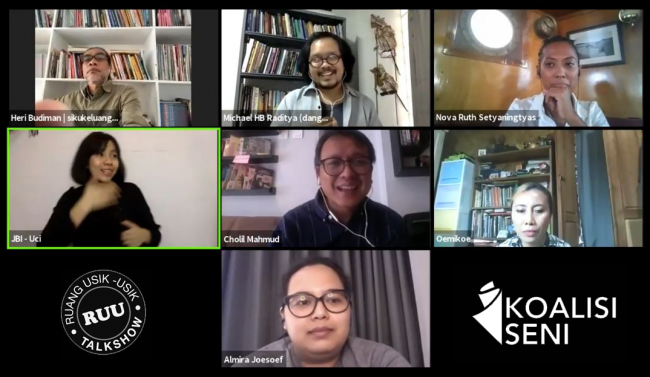Jakarta – Ruang bermusik adalah salah satu komponen penting dalam pemajuan ekosistem musik. Namun, perbaikan ruang bermusik yang diperlukan bukanlah sekadar membangun infrastruktur fisik. Sebab, banyak faktor lain yang juga butuh diperbaiki. Kelima pembicara diskusi “Menilik Ruang Bermusik” yang digelar Koalisi Seni pada Selasa, 6 Oktober 2020, membahas beragam faktor tersebut.
Masyarakat adat Ciptagelar di Jawa Barat misalnya, memandang pendatang perlu memahami konteks dan kebijakan lokal. Contohnya, saat berpartisipasi dalam ritual setempat yang telah diadakan ratusan tahun seperti syukuran panen Seren Taun. Perwakilan Ciptagelar, Umi Kusumawati, menilai tantangan muncul saat wilayahnya dipandang sebagai tempat pariwisata.
“Ketika ada orang datang minta disajikan musik tertentu, mengubah jalan acara yang sudah ada, kami tidak mau. Kami harap siapapun yang ingin berkontribusi mengembangkan kesenian, baik pemerintah maupun swasta, harus memperhatikan tatanan nilai-nilai di suatu tempat. Bukan mengubah yang sudah ada,” ucapnya.
Sementara itu, Heri Budiman yang menggagas Festival Musik Rimbang Baling untuk menyelamatkan hutan lindung di Provinsi Riau itu berpendapat pihaknya perlu filantrop, bukan sponsor. Apalagi, yang menuntut imbalan seperti pemasangan spanduk dan baliho sehingga malah bakal jadi sampah dan mencemari lingkungan.
“Kami perlu yang memberi dengan ikhlas. Kami juga tidak bisa menerima bantuan dari perusahaan kayu dan sawit yang merusak alam. Dari segi pemerintah, kami perlu kebijakan yang lebih pro alam,” kata anggota Koalisi Seni itu.
Musisi Nova Ruth, inisiator Arkakinari yang telah berkeliling Indonesia dan dunia untuk pentas seni di perahu layar, menilai perlu ada perubahan pola pikir serta peningkatan rasa saling percaya.
Anggota Koalisi Seni tersebut menuturkan, “Saat membuat acara di lokasi yang kami lewati, banyak sekali protokol yang harus dilalui, jadi habis energi. Mungkin kita perlu menumbuhkan kepercayaan. Lalu di tengah pandemi, saat berlabuh meski sudah rapid test kami tetap tidak boleh turun ke darat. Padahal jari kami sudah habis untuk di-rapid,” tuturnya.
Peneliti dangdut Michael HB Raditya mengutarakan selain infrastruktur, ada tantangan soal perizinan, peningkatan fungsi asosiasi pegiat dangdut, dan pola pandang terhadap genre musik itu. Menurutnya, untuk mendapat perizinan, ada kecenderungan Orkes Melayu dimiliki orang berpangkat pada masa awal Orde Baru. Ada juga yang mengakali dengan memakaikan seragam militer pada orang saat konser dangdut, agar terkesan sudah berizin.
“Sekarang, beberapa pemerintah daerah mengelola izin dengan mengharuskan musisi dangdut mendaftar dan mendapatkan kartu. Pendataan oleh pemerintah ini langkah strategis, tapi sayang kalau alasan pendataan hanya perkara izin. Dari segi asosiasi, banyak yang fungsinya cuma pendataan. Padahal, asosiasi bisa berperan penting untuk edukasi, pembinaan, dan urun rembuk hal yang lebih krusial. Selain itu, dangdut jangan dipandang sebatas sisi ekonominya, tapi perlu dilihat sebagai aktivitas budaya yang para stakeholders-nya terus menerus bernegosiasi. Sehingga, kelak urusan ruang dan infrastruktur bukan hanya soal rambu-rambu, tetapi bisa jadi stimulan bumbu-bumbu agar penciptaan ruang musik lebih asyik,” ujarnya.
Penggagas gelaran musik di ruang yang akrab (intimate), Sofar Sounds Jakarta, Almira Joesoef, memaparkan banyak pihak perlu memberi dukungan lebih baik lagi. Antara lain, soal ketersediaan fasilitas dasar seperti terpal dan toilet, bisa dibantu oleh pemerintah maupun swasta. Pemerintah pun bisa berperan memberi dukungan finansial bagi band musik, termasuk alumni Sofar Sounds, untuk manggung di luar negeri. Pendidikan musik juga penting bagi stakeholders ekosistem musik, dan pendengar perlu mengapresiasi musisi meski sesederhana bertepuk tangan ketika lagu usai.
“Jangan main HP terus waktu konser,” ucapnya berseloroh. “Kita perlu dukungan bukan cuma dari pemerintah, tapi dari semua sektor karena kita membangun ekosistem. Bantuan apapun akan berarti, yang terpenting adalah kerja samanya.”
Diskusi hari ini, dimoderatori oleh musisi Cholil Mahmud, adalah inisiatif anggota Koalisi Seni yang bergerak dalam ekosistem musik. Untuk memajukan ekosistem tersebut, diskusi terkait topik penting lainnya dalam musik akan kembali diadakan pada masa mendatang.
Unduh siaran pers ini di sini. Notula webinar dapat diakses di laman ini.
Simak rekaman webinar ini dalam video berikut:




